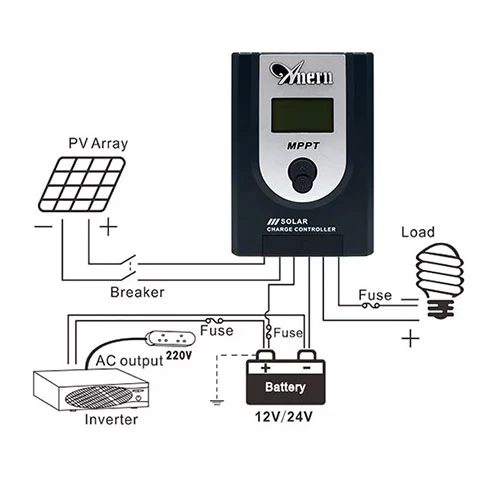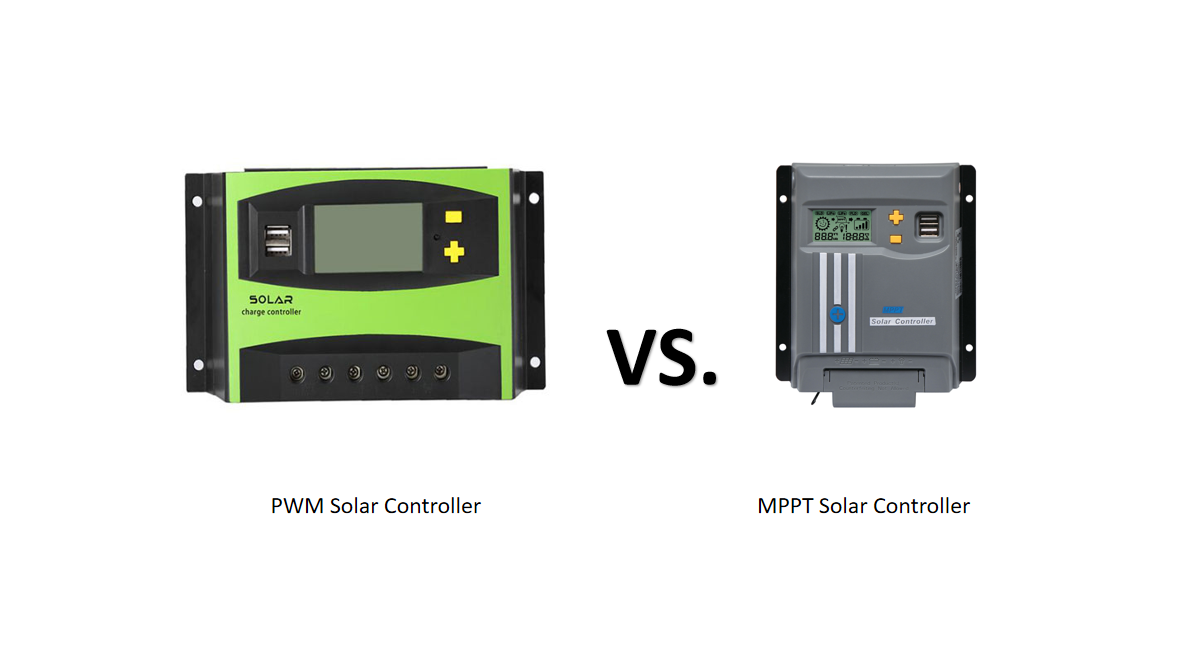What is MPPT solar charge controller?
MPPT or Maximum Power Point Tracking is an algorithm included in a charge controller to extract the maximum available power from a photovoltaic module under specific conditions. The voltage at which a PV module can produce maximum power is called the “maximum power point” (or peak power voltage). Maximum power varies with solar radiation, ambient temperature, and solar cell temperature.
MPPT solar charge controller is a device used in solar power generation systems to convert the DC power generated by solar panels into the DC power required by the battery. It optimizes the output power of solar panels to maximize battery charging. The MPPT solar charge controller maximizes the use of the output power of the solar panel by monitoring the output voltage and current of the solar panel in real time and adjusting the charging current based on these data.

Working principle of MPPT solar charge controller:
Monitor the output voltage and current of the solar panel: MPPT charge controller understands the output power of the solar panel by monitoring the output voltage and current of the solar panel.
Calculate the maximum power point of the solar panel: MPPT charge controller understands the output power of the solar panel under different lighting conditions by calculating the maximum power point of the solar panel.
Adjust charging current: The MPPT charge controller keeps the output power of the solar panel at the maximum power point by adjusting the charging current to maximize the use of the output power of the solar panel.
Control the charging process: By controlling the charging process, the MPPT charge controller ensures that the battery can be charged safely and quickly, while reducing charging losses and extending the service life of the battery.
The working principle of the MPPT solar charge controller is to maximize the output power of the solar panel by controlling the output current of the solar panel. When the output voltage and current of the solar panel change, the MPPT solar charge controller will monitor these changes in real time and adjust the charging current to maintain the maximum output power of the solar panel.
What is the difference between MPPT and PWM solar charge controllers?
MPPT solar charge controller is one of the two main charge controllers on the market. Another option is a pulse width modulation or PWM charge controller. PWM regulates the current flow to the panel through transistors that turn on and off quickly.
MPPT solar charge controller has the following advantages compared with traditional PWM solar charge controller:
It can maximize the output power of solar panels and improve charging efficiency;
Can adapt to different solar panels and batteries to improve system compatibility;
It can reduce charging loss and extend the service life of the battery;
It can provide better charging control and improve system stability.

Which brands of MPPT solar charge controllers are better?
There are many brands of MPPT solar charge controllers on the market, among which the more popular brands are:
Victron: This brand’s MPPT controller has high efficiency, reliability and stability, and can achieve fast power tracking and maximum power point tracking, improve the conversion efficiency of solar panels and extend battery life.
Outback: This brand’s MPPT controller also has high efficiency, reliability and stability, and can achieve fast power tracking and maximum power point tracking, improve the conversion efficiency of solar panels and extend battery life.
Morningstar: On the basis of high efficiency, reliability and stability, this brand’s MPPT controller also has a variety of protection functions, such as overvoltage protection, overcurrent protection, reverse protection, etc., to ensure the stable operation and stability of the solar power generation system. safety.
How to judge the quality of an MPPT solar charge controller?
To judge the quality of an MPPT solar charge controller, you can start from the following aspects:
Maximum Power Point Tracking (MPPT) Efficiency: MPPT efficiency is an important measure of MPPT solar charge controller performance. A high-efficiency MPPT controller can better utilize the output power of solar panels, improve charging efficiency, and reduce charging losses. Generally speaking, MPPT efficiency should be above 95%.
Stability and reliability: MPPT solar charge controller needs to work normally in various working environments, including temperature, humidity, altitude and other factors. Therefore, the stability and reliability of the controller are very important. Generally speaking, controllers from well-known brands will have better quality and reliability, but will also be more expensive.
Functions and parameters: MPPT solar charge controller needs to have some basic functions and parameters, such as charging current, charging voltage, maximum power point tracking range, input voltage range, output voltage range, etc. These parameters need to be selected according to the needs of the system. At the same time, the protection functions of the controller are also very important, such as overvoltage protection, overcurrent protection, reverse protection, etc., which can ensure the stable operation and safety of the system.
User reviews and reputation: User reviews and reputation are one of the important basis for judging the quality of an MPPT solar charge controller. You can learn about the actual use effect and user feedback of the controller by checking the user reviews and word-of-mouth reviews of the controller.
Are MPPT Solar Charge Controllers Worth It?
Whenever you’re weighing whether a major purchase is worth it, the answer depends on your usage, your needs, and the degree of difference between the purchase options. For MPPT controllers, it depends on whether your benefits (including increased energy production) are enough to justify the additional cost over time.
However, in the absence of these circumstances, an MPPT solar charge controller will give you significant advantages that will pay off over time. It allows you to get the most out of your system, avoid energy losses, and maintain peak delivery throughout the year.
In conclusion
Your solar system is a significant investment in your home, and an MPPT controller can help you improve your return on investment. The more efficiently you can generate and store energy, the faster you will get a financial return on your initial investment. MPPT solar charge controllers get you a positive ROI faster.











